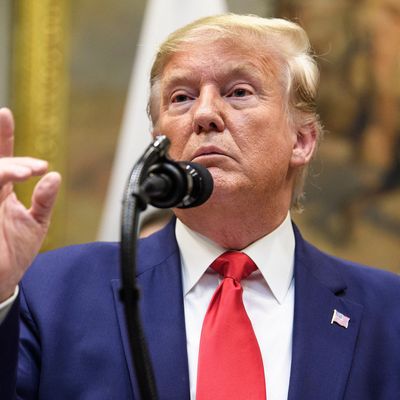
Advising President Donald Trump on the law, and formally expressing his views thereof, is a pitiable task. Trump’s worldview is almost wholly incompatible with the law. The latter is premised on neutral rules, mediated by precedent and constructed with the goal of some notion of abstract fairness. The former is rooted in an entitlement to absolute domination regardless of circumstance.
The White House letter rejecting the House impeachment inquiry is an effort to reconcile the irreconcilable. At the level of tone, it reads like an extended Trumpian rally diatribe lightly edited by an attorney. At the level of substance, it is almost pure, uncut Trump. It repeats a series of immaterial, laughably false claims, surrounding the audacious thesis that impeaching Trump is literally illegal.
The letter’s most persistent argument revolves around attacks on House Intelligence Committee Chairman Adam Schiff. In one of the letter’s few concessions to legal propriety, it does manage to avoid calling him “pencil neck,” “shifty,” or “lil’ adam schiff.” Other than this, it hews closely to Trump’s methods of argument.
The letter charges that Schiff “chose to concoct a false version of the call and to read his made-up transcript,” a “fact” that, it proceeds to assert, proves Trump did nothing wrong. The “fact” is also one of those bizarre implanted memories from the Fox News fever swamp. Schiff, in a hearing, paraphrased Trump’s call to Ukrainian President Vlodomyr Zelensky, saying, “In not so many words, this is the essence of what the president communicates,” before going on to summarize Trump’s meaning. Trump and his allies have pretended this paraphrase, which Schiff openly billed as a paraphrase, was an attempt to concoct a falsified transcript of the call. It is unnerving to see this unhinged fantasy not only making its way into a formal White House legal document, but playing a central role in its argument.
The letter also cites, by way of defending Trump, two additional pieces of evidence to establish his innocence. It notes that the Department of Justice reviewed the call and did not find a campaign finance violation — as if a campaign finance violation is the only, or even primary problem with extorting a foreign leader for dirt on domestic rivals, and as if Trump’s attorney general is a remotely credible figure. Even more comically, it notes that Zelensky has publicly stated, in Trump’s presence no less, that he was not pressured on the call — as if the leader of a country dependent on American support for its very existence, who has already been extorted, is in a position to undercut its president.
The presence of these vapid talking points in a putative legal document is tribute to the dearth of support for its shocking central claim: that the House has no right to impeach Trump. It calls the proceedings “illegal,” and one of Congress’ “unconstitutional efforts to overturn the democratic process.” There is no remotely plausible constitutional theory to support this claim. The Constitution gives the House absolute right to conduct impeachment hearings in a manner determined by the House.
The letter complains that the House fails to grant Trump sufficient control over the impeachment agenda. Though there’s a reason for that — the trial takes place in the Senate, not the House — Trump could in theory try to negotiate for more Republican input into the process. In a briefing with reporters, a senior administration official was asked what changes Trump would need to cooperate. “A full halt” was the answer. That is, Trump will cooperate with an impeachment probe if Democrats stop the impeachment probe.
Such Catch-22 absurdities give this administration no embarrassment. Since Democrats took control of the House last January, Trump has asserted it has no right to investigate him for crimes, no right to obtain his tax returns despite a law clearly authorizing exactly that, and that prosecutors can neither charge nor investigate his criminal activity. He has claimed the right to start or stop any federal legal proceeding. Some of his positions grow out of the extreme unitary executive theory that figures like William Barr have developed for years, though only ever applied to Republican presidents.
But it is, in the main, an expression of Trump’s idiosyncratic convictions. This is a president who asserted his “absolute right” to investigate any person he wants, for any reason, even while facing impeachment for abuse of power. He has no conception of the law, except as a tool to compel his opponents to submit to him. His every response to impeachment proves its necessity.






























